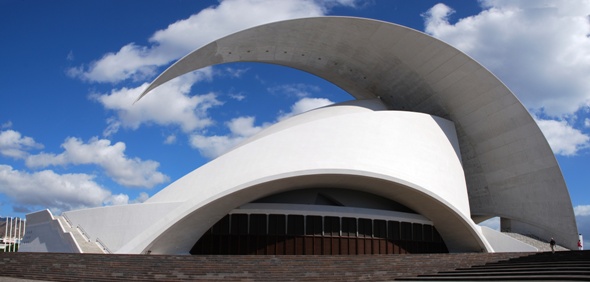Chicago Symphony on Tour: It’s a red-carpet welcome and rave reviews in Spain’s Canarias
Report: The sail-like hall on the shore of Tenerife, one of Spain’s Canary Islands off the coast of Africa, was home for two concerts by the Chicago Symphony Orchestra this week. Now it’s off to Germany.
By Nancy Malitz
When the musicians of the Chicago Symphony Orchestra, in the middle of their European tour, departed for Essen, Germany, on Jan. 15, they left behind Spain’s beautiful Canary Islands. The orchestra conducted by music director Riccardo Muti provided pairs of headliner concerts in each of two cities during the Festival Internacional de Música de Canarias, which is celebrating its 30th anniversary this year.
 By all media accounts, the first visit ever by the Chicago Symphony Orchestra to Spain’s Canary Islands may be judged a success. Muti, a favorite from three previous visits to the archipelago, is revered for his musicianship and moral authority, and with his new orchestra he has lent the Festival Internacional de Música de Canarias an extra reason for celebration in its round-numbered year.
By all media accounts, the first visit ever by the Chicago Symphony Orchestra to Spain’s Canary Islands may be judged a success. Muti, a favorite from three previous visits to the archipelago, is revered for his musicianship and moral authority, and with his new orchestra he has lent the Festival Internacional de Música de Canarias an extra reason for celebration in its round-numbered year.
The headline to a review by Diego F. Hernández, writing for La Provincia, declared: “An historic night with Maestro Muti,” with the writer expressing delight that the festival’s three-decade wait to win a visit from the Chicago Symphony, “a longtime demand – that had seemed unachievable for economic reasons – was fulfilled.”
 The artistic profile of the Canary Islands is tied to its importance as a cultural tourist destination. The centerpiece photo on the front page of the Canarias7 weekend edition showed Muti and the CSO below an all-caps banner proclaiming an increase of 450.000 more tourists to the islands in 2013. Festival director Candelaria Rodriguez told Spain’s national daily newspaper ABC that securing the Chicago Symphony and Muti together is “a step in the founding objective of the festival to promote tourism through culture.”
The artistic profile of the Canary Islands is tied to its importance as a cultural tourist destination. The centerpiece photo on the front page of the Canarias7 weekend edition showed Muti and the CSO below an all-caps banner proclaiming an increase of 450.000 more tourists to the islands in 2013. Festival director Candelaria Rodriguez told Spain’s national daily newspaper ABC that securing the Chicago Symphony and Muti together is “a step in the founding objective of the festival to promote tourism through culture.”
Yet Spanish and Italian media closely covered Muti’s expressions of concern, at a festival press conference, that European governments were cutting support of the arts too much in the wake of the recession, and that culture does not exist to make a profit. (His own Rome Opera is at a point of crisis.) “To remove culture means to brutalize,” Muti said, adding that culture is for everyone. “If we close our children off from the chance to approach culture, we are doomed to a future of very shallow and dangerous people.”
Coincidence or not, the newspapers were all over the CSO’s Citizen Musician outreach activities, in which member musicians and their constituent ensembles practice a less formal — more person-to-person — form of music-making through master classes and chamber music concerts in schools, neighborhood halls and care centers. Here’s a full-page spread:
 Serious consideration to the music on the orchestra’s concert programs was also given, and more reviews are expected. In Canarias7, a review by Victoriano S. Álamo entitled “A LA VIDA ETERNA CON MUTI,” (To Eternal Life With Muti) described the Muti-CSO performance of Strauss’ tone poem “Death and Transfiguration” as follows:
Serious consideration to the music on the orchestra’s concert programs was also given, and more reviews are expected. In Canarias7, a review by Victoriano S. Álamo entitled “A LA VIDA ETERNA CON MUTI,” (To Eternal Life With Muti) described the Muti-CSO performance of Strauss’ tone poem “Death and Transfiguration” as follows:
“People talk about placid death. Even about sweet death. But this is only a legend. Dying can never be pleasant, at least until last night…. Those who know Strauss’ piece are well aware of its beauty and delicacy. But in the hands of the Chicago Symphony Orchestra, which is widely considered one of the best ensembles in the world – the best one, according to some critics – it meant an authentic placid ascent to eternal life. Sounding like one single instrument, the string section shone next to celestial clarinets.”
Related Link:
Tour diary and photos: Visit CSO Sounds and Stories
Tags: Chicago Symphony Orchestra, Citizen Musician, Festival Internacional de Musica de Canarias, Riccardo Muti



